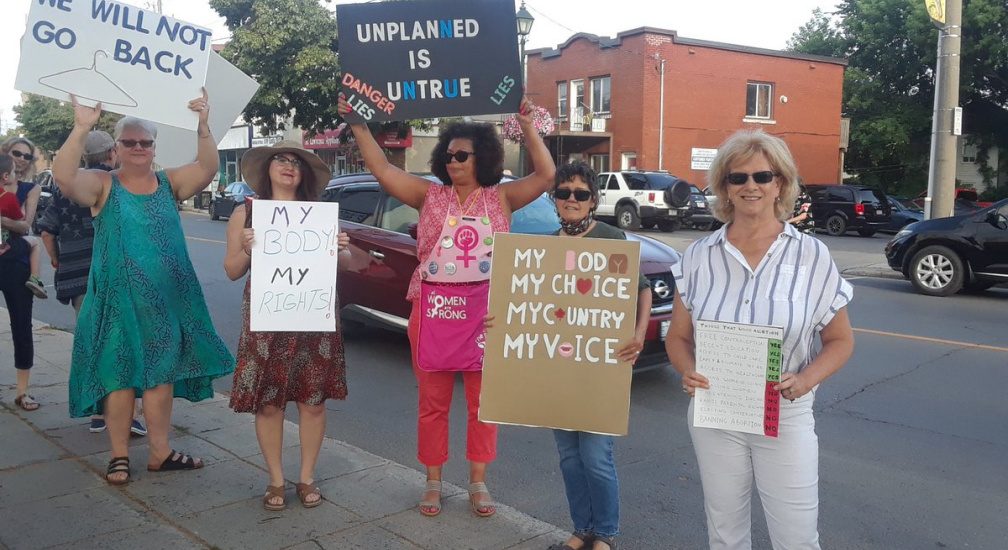
KJIPUKTUK (Halifax) – When Cineplex opted to screen the anti-choice movie ‘Unplanned’ medical experts and advocates for reproductive health care in Nova Scotia were surprised and disappointed. Many tried to reason with Cineplex management but CEO Jacob Ellis released a letter stating they were “confident in the decision” and Unplanned would be screened in the name of freedom of expression.
Free speech is vital, but that’s not what is at issue here. Simply declining to show a film infringes on no one’s rights. Some are surprised that ‘Unplanned’ made it into nearly 60 theatres nationwide when many independent Canadian films of similar budget are not shown at all. Any groups interested would be free to show the film in their own buildings or even rent out a theatre for a public screening. Moreover, the question of free speech is muddied by the many reported inaccuracies in the film.
For example, the pivotal scene – which Adam R. Holz of PluggedIn.com recounts here – involves Abby Johnson played by Ashley Bratcher watching an abortion of a 13 week fetus on an ultrasound screen. In this scene, the fetus appears to recoil in fear, express pain and attempt to cling to the lining of the patient’s uterus.
Fetal pain during abortion is impossible before the third trimester.
The nervous system network required to feel sensation is not in place until at least the third trimester. Also, pain perception requires a filtering experience involving emotions and exposure to the outside world, which a fetus does not have.
This means that what Abby Johnson – at the time, a clinic director with Planned Parenthood – claims to have seen could not be a pain response from the 13 week fetus. Furthermore, there is no record of the procedure she describes ever occurring.
The scene depicts the doctor callously joking “beam me up, Scotty!” as the procedure commences. The line is clearly included to illustrate the perceived heartlessness and lack of respect for life on the part of doctors and other professionals who perform and facilitate abortion care. It’s this kind of disinformation about abortion and those who perform them that has prompted violence against and murder of doctors, nurses, clinic staff and patients.
‘Unplanned’ also pushes the narrative that abortion is a for-profit, highly lucrative endeavour and it’s apparently this road to fetal tissue riches prompting many to look the other way.
“The movie’s main antagonist is Abby’s cold and heartless boss, Cheryl…She says that abortion is what pays for everything at Planned Parenthood.”
Abortion is not profitable.
The procedure accounts for very little of the work that Planned Parenthood does – about 3 or 4%.
As this graphic excerpt from the same review illustrates, there is significant dramatization of the procedure intended to show it as dangerous, bloody and secretive:
“…girl whose uterus is inadvertently perforated…blood oozing down her legs in a chair afterwards, then back in a surgical procedure room as the doctor tries to get the bleeding stopped. The clinic’s director…says that they never call 911 or take someone to a hospital emergency room, since the ensuing negative publicity would spotlight some of the inherent health risks of abortion. The girl nearly dies, but they never tell her waiting father that there was a complication.”
Abortion is safe and does not cause depression or any other medical conditions.
Surgical abortion is one of the safest types of medical procedures. Complications from having a first-trimester aspiration abortion are considerably less frequent and less serious than those associated with giving birth.
“The pregnancy-associated mortality rate among women who delivered live neonates was 8.8 deaths per 100,000 live births. The mortality rate related to induced abortion was 0.6 deaths per 100,000 abortions.”
The American Psychological Association has concluded that there is no scientifically valid support or evidence for the so-called “postabortion syndrome” of psychological trauma or deep depression. “The most frequent response women report after having ended a problem pregnancy is relief, and the majority of women are satisfied that they made the right decision for themselves.”
That is certainly in line with how I feel now, 15 years after an abortion. I have not had children and do not intend to. I am grateful every day that I had the freedom to make a decision that was right for me.
Had I seen this film when I was 19, sick, scared and 6 weeks pregnant it could have affected my decision. I had no particular leaning towards pro-choice at that time. I was not aware of all the facts outlined here.
All of this is why it’s an essential to get the facts about abortion out in light of this film being shown in Halifax. It’s why I went to the Dartmouth Crossing Cinema while the film was showing to distribute this information. Unfortunately, the employees of Cineplex had to clean it all up afterwards. I would have preferred not to make more work for them. One theatre employee from Ontario has reached out to pro-choice organizers to express their discomfort. I hope at least one Cineplex Dartmouth Crossing employee felt less alone and/or more informed after my actions that night.
It’s important that all people who have had an abortion or are considering one know that they’re not alone, that this film that’s designed to make them look like and feel like terrible people is full of deception.
We have seen many times in the past when anti-choice organizations and individuals have used deceit, disinformation and propaganda to convince lawmakers to undermine this fundamental right to bodily autonomy. Recently, in the US many states have passed bills which would remove almost all abortion access. Medical disinformation fuels these legislative efforts and has real, dire consequences for transgender, non-binary people and women.
Despite the poor reviews, the film is doing relatively well in Canada. There are more protests and events yet to come. The hashtag #ProtestUnplanned is being used on social media to track pro-choice actions across the country.
‘Unplanned’, written and directed by Chuck Konzelman and Cary Soloman is showing at Dartmouth Crossing Cineplex until Thursday July 18.
Nova Scotians seeking information or to book an appointment for a surgical or medical abortion can confidentially call the Nova Scotia Women’s Choice Clinic at 1-833-352-0719.
Come ask questions, chat about abortion rights and get some fact sheets clearing up the disinformation in the film ‘Unplanned’ this Friday, July 19, between 2 pm and 5 pm, at Victoria Park. Facebook event info here.
With a special thanks to our generous donors who make publication of the Nova Scotia Advocate possible.
Subscribe to the Nova Scotia Advocate weekly digest and never miss an article again. It’s free!



